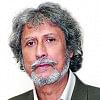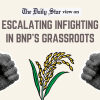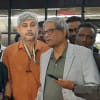BNP: Defiantly dismissive of its ailments
All is not well with Bangladesh Nationalist Party (BNP) at the moment and this is no big secret. On many occasions in the recent past it shot itself in the foot but instead of looking within they chose to blame others for it. Therefore, when some senior leaders of the party say that BNP will rise again from the ashes like the proverbial Phoenix, it clearly sends the message that it is down, if not totally out. But Khaleda Zia, the party chief, fails to come to terms with the ground reality and remains defiantly dismissive of the many ills that grip her party. The malaise afflicts the party from the grassroots level to the top; as such, Khaleda Zia's rhetoric of toppling the incumbent government through spearheading a people's movement blatantly belies the concerns of the senior leaders about the party's present unity and strength. Such dichotomy existing between the party chief and senior members becomes conspicuously discordant, especially at a time when many of the senior leaders of the party remain detached by choice from the central office and many of whom are reportedly in a state of incommunicado with the chief.
The reference to the Phoenix by the senior leaders rings almost apocalyptic in tone. What did they mean by it? Perhaps there is a late realisation among them that BNP has burnt itself out pretty badly during the three-month long blockade and the ensuing spate of murder and mayhem on the roads since January this year. They fought vengeful yet unrewarding battles against the common people on the roads, killing them in mindless arson attacks on passenger vehicles. They killed common people–people who looked up to politicians for bringing peace and harmony in society so that they could work and change their lives.
When in conversation, many senior and mid-level leaders of BNP, on condition of anonymity, express their disapproval and frustration over the three-month long fiasco–the blood-letting frenzy. Khaleda Zia's bunkering down in her office for three months is not considered by many as the best political strategy.
It appears BNP is being run on an ad hoc basis by some lone rangers. They pop up from here and there and release some statements in the name of the party chief. But they can hardly send ripples through the still water. It only proves the point that a political party cannot be run properly and effectively by some lone fighters in the absence of a central command. To become an effective force, it has to become a cohesive whole under a band of experienced and dedicated generals led by a clever commander-in-chief.
Khaleda Zia's desperation to get a stronghold in politics becomes conspicuously manifest when she, instead of depending on the strength of the party and a well-crafted manifesto of governance, now seems to depend more on divine intervention to gain power. She told her followers the other day that everywhere, everyone was praying for the end of the present government and therefore its days are numbered! Well, there is no harm in calling for divine support but in politics one needs some clever moves and some tricks up the sleeve to win votes.
BNP will need to do a lot of homework to remain a political party worth the name. There is a veritable lack of ideology in the party to attract young followers. The present stock of leaders lacks the magnetism to draw the attention of young voters. Among the educated and enlightened present generation, there is little enthusiasm about late BNP founder Ziaur Rahman in comparison to the appeal of Bangabandhu Sheikh Mujibur Rahman as the architect of Bangladesh. The party has not been able to offer anything exciting to the tech-savvy young generation in this technology driven world.
That BNP and its high commands remain oblivious to its present ailments became glaringly patent when Khaleda Zia went to attend the iftar party organised by her coalition partner, Jamaat. It undoubtedly brought a twist to the BNP saga. Political watchers of the country as well as many senior party members were under the impression that the top leadership of the two parties were slowly but steadily drifting apart. They are now busy trying to deduce what kind of message Khaleda Zia wanted to send across by attending the iftar party. Is she trying to say that the alliance is as strong as ever? Or is it just a courtesy call to say hello to a one time strong ally? Political pundits say that she gained no political mileage by attending the iftar party.
It appears from the open as well as passive opinions of activists and followers at different tiers of the party that they are not happy with the way BNP is being run. They want it to rise again from the ashes and become a force worth reckoning. But they have no idea how that will happen. It seems the top leadership in BNP will have to face tough challenges from within after Eid.
The writer is Special Supplements Editor, The Daily Star.

 For all latest news, follow The Daily Star's Google News channel.
For all latest news, follow The Daily Star's Google News channel. 








Comments